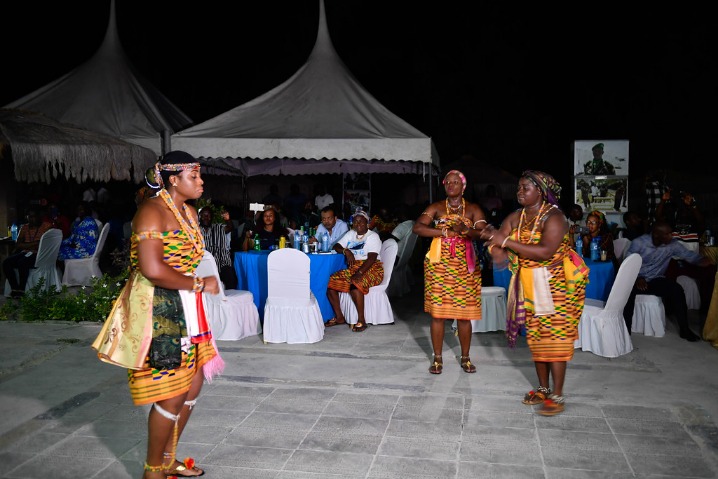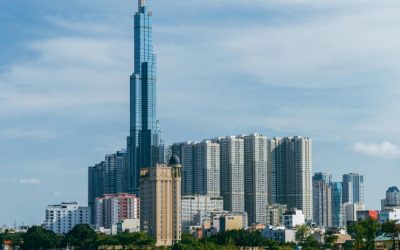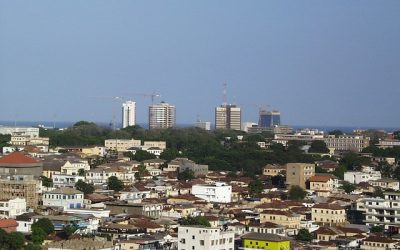Accra: The Capital City of Ghana
Accra, the vibrant capital city of Ghana, is a bustling metropolis known for its rich history, diverse culture, and dynamic economy. As the political and economic hub of the country, Accra offers a unique blend of modern development and traditional Ghanaian heritage. Visitors and locals alike enjoy its lively markets, historic sites, and warm hospitality, making it a key city within the broader landscape of Ghanaian cities.
History and Development of Accra
Accra, the bustling capital city of Ghana, stands as a vibrant hub of history, culture, and development. Originally a small fishing village, Accra has grown dramatically over the centuries, evolving into a major economic and political center in West Africa. Its rich history dates back to the colonial period when it was known as a key port and trading post under British rule. The city played a significant role in Ghana’s journey toward independence, which was achieved in 1957. Since independence, Accra has experienced rapid urbanization, driven by population growth and infrastructural development. Today, Accra is a dynamic metropolis characterized by modern skyscrapers, bustling markets, and diverse neighborhoods, reflecting its importance as a center of governance, commerce, and culture in Ghana. The city continues to develop swiftly, balancing its historical heritage with contemporary advancements to shape its future as a leading city in the region.
Major Landmarks and Attractions
Accra, the capital city of Ghana, is a vibrant metropolis known for its rich history, bustling markets, and modern skyline. It serves as the political, economic, and cultural hub of the country, attracting both locals and tourists alike.
Major landmarks in Accra include the Independence Square, a significant site celebrating Ghana’s independence, and the National Museum of Ghana, which offers insights into the nation’s history and culture. The Labadi Beach provides a scenic coastal experience with lively music and local cuisine, perfect for relaxation. The W.E.B. Du Bois Center is dedicated to the celebrated scholar and civil rights activist, reflecting Ghana’s historical ties to the African diaspora.
Tourists often visit the Cape Coast Castle nearby, a UNESCO World Heritage Site that tells the story of Africa’s colonial past and the trans-Atlantic slave trade. Osu Castle, also known as Cape Coast Castle, and the bustling Makola Market showcase Accra’s vibrant commerce and local crafts. For those interested in art, the Artists Alliance Gallery displays contemporary Ghanaian artwork and crafts, offering a glimpse into the country’s creative spirit.
Economy and Industrial Hub
Accra, the capital city of Ghana, is the vibrant heart of the nation’s political, economic, and cultural activities. As a bustling metropolis, it serves as the primary gateway for international trade and tourism, showcasing a blend of modern infrastructure and rich heritage. The city is known for its lively markets, historic sites, and diverse populations, making it a dynamic urban center.
Economically, Accra plays a crucial role in Ghana’s development. It hosts numerous financial institutions, government offices, and multinational corporations, contributing significantly to the country’s GDP. The city’s economy is driven by sectors such as services, manufacturing, and trade, with a growing emphasis on telecommunications, banking, and real estate. Its strategic location along the coast also enhances its importance as a port city, facilitating international commerce.
Accra is also recognized as an industrial hub, with many factories and industrial parks that produce goods ranging from textiles to electronics. This industrial activity supports employment and fosters innovation within the region. Additionally, ongoing urban development projects aim to improve infrastructure, transportation, and public services, reinforcing Accra’s status as Ghana’s economic powerhouse and a key city in West Africa.
Cultural and Nightlife Scene
Accra, the vibrant capital city of Ghana, is renowned for its rich cultural heritage and lively nightlife scene. As a bustling metropolis, it offers a unique blend of tradition and modernity that attracts both locals and tourists alike. The city’s diverse cultural festivals, historic sites, and bustling markets showcase Ghanaian heritage, while its vibrant nightlife features a variety of entertainment options that come alive after sunset.
- Art and Culture: Accra is home to numerous museums, art galleries, and theaters that celebrate Ghanaian art and history. The W.E.B. Du Bois Center and the National Museum are popular cultural landmarks.
- Festivals: The city hosts lively festivals such as Homowo and Chale Wote, which feature traditional music, dance, and colorful parades that offer a glimpse into Ghanaian culture.
- Nightlife: Accra boasts a vibrant nightlife scene with stylish bars, nightclubs, and live music venues. Areas like Osu and Labone are renowned for their energetic nightlife and diverse entertainment options.
- Local Cuisine: Visitors can indulge in Ghanaian delicacies such as Jollof rice, Banku, and fried fish at numerous street food vendors and upscale restaurants throughout the city.
- Shopping and Souvenirs: The bustling markets of Makola and Kaneshie offer a wide array of traditional crafts, fabrics, and jewelry, allowing visitors to experience local commerce and culture.
Kumasi: The Garden City
Kumasi, often referred to as the Garden City, is a vibrant and culturally rich city located in Ghana. Known for its lush greenery, bustling markets, and historic significance, Kumasi serves as the capital of the Ashanti Region. It is a hub of tradition, commerce, and urban development, making it a prominent city in Ghana’s landscape of urban centers.
Historical Significance and Kingdom of Ashanti
Kumasi, often referred to as The Garden City of Ghana, is a vibrant and historically significant city located in the Ashanti Region. Known for its lush parks, botanical gardens, and rich cultural heritage, Kumasi is a hub of traditional Ghanaian culture and modern development.
Historically, Kumasi has played a crucial role as the capital of the Ashanti Kingdom, one of the most powerful and influential kingdoms in West Africa. The city was the center of the Ashanti Empire’s political and economic activities, especially during the height of its power in the 18th and 19th centuries. The Ashanti Kingdom is renowned for its rich traditions, elaborate chieftaincy system, and impressive craftsmanship, particularly in gold and kente cloth weaving.
The importance of Kumasi extends beyond its cultural roots, as it also served as a strategic center during colonial times and played a key role in Ghana’s independence movement. Visitors to Kumasi can explore historical sites like Manhyia Palace, the seat of the Asantehene (the king of the Ashanti), and learn about the deep-rooted history and traditions of the Ashanti people.
Today, Kumasi continues to blend tradition with modernity, making it a vital city in Ghana’s national landscape. Its bustling markets, vibrant festivals, and historical landmarks attract numerous visitors, showcasing its status as a city of cultural pride and historical significance within Ghana.
Key Tourist Attractions
Kumasi, known as The Garden City, is a vibrant cultural hub in Ghana renowned for its lush greenery, rich history, and lively markets. The city is a center of Ashanti tradition and offers visitors a unique blend of cultural experiences and natural beauty.
One of the key attractions in Kumasi is the Manhyia Palace, the historic residence of the Ashanti King, which offers insight into the traditional governance and royal heritage of the Ashanti people. The Kejetia Market is another must-visit destination, famous for its bustling atmosphere, wide array of goods, and local crafts.
The Kumasi Botanical Gardens provides a tranquil escape with diverse flora, beautiful landscapes, and a peaceful environment ideal for relaxation and sightseeing. Lake Bosomtwe, a natural crater lake located near Kumasi, is popular for its scenic beauty, water activities, and cultural significance to local communities.
Additionally, the Rattray Park offers a family-friendly outdoor space with gardens, play areas, and recreational activities, making it a perfect spot for both locals and tourists to unwind. Kumasi is a city that beautifully captures Ghana’s cultural richness and natural splendor, making it a significant destination for travelers seeking an authentic Ghanaian experience.
Markets and Local Crafts
Kumasi, often referred to as The Garden City, is a vibrant city in Ghana renowned for its lush greenery, rich history, and bustling markets. The city’s nickname stems from its abundance of parks, gardens, and tree-lined streets, making it a picturesque urban space. Kumasi is a cultural hub, home to the Ashanti Kingdom, which greatly influences its traditions, festivals, and architecture.
The markets in Kumasi are among the largest and most lively in West Africa. The Kejetia Market, in particular, is a sprawling commercial center where traders sell everything from textiles and beads to fresh produce and crafts. Visitors can experience the vibrant energy of the marketplace, bargain for unique goods, and immerse themselves in local trade practices.
Local crafts are an integral part of Kumasi’s identity, with artisans producing beautiful textiles, wood carvings, and jewelry that reflect Ashanti artistry. Kente cloth, renowned for its intricate patterns and vibrant colors, is one of the city’s most famous craft products. These crafts are not only valuable for their aesthetic appeal but also hold cultural significance, representing stories, status, and identity in Ashanti society.
Overall, Kumasi exemplifies the dynamic spirit of Ghana, where tradition and modernity coexist through its lush gardens, thriving markets, and beautiful crafts. It remains a must-visit city for those seeking to explore Ghana’s cultural wealth and lively community life.
Educational and Cultural Institutions
Kumasi, often referred to as The Garden City, is a vibrant city in Ghana renowned for its rich cultural heritage and lush greenery. It serves as a major educational and cultural center in the country, attracting visitors and students alike. The city is home to several prominent educational institutions, including the Kwame Nkrumah University of Science and Technology, which offers a wide range of programs and attracts students from across Africa and beyond. Additionally, Kumasi hosts numerous schools specializing in arts, science, and technology, fostering a vibrant academic environment.
Beyond education, Kumasi boasts a wealth of cultural institutions that showcase Ghanaian traditions and history. The Kwame Nkrumah Mausoleum and the Manhyia Palace are notable landmarks that reflect the city’s historical significance and royal heritage. The city also features various museums, art galleries, and craft markets, where visitors can experience local arts, crafts, and performances. Kumasi’s lively cultural scene and its commitment to preserving heritage make it a key city in Ghana’s national identity and tourism industry.
Takoradi: The Oil and Industrial City
Takoradi, known as the Oil and Industrial City, is a prominent urban hub in Ghana’s Western Region. Renowned for its vibrant port, bustling industries, and growing economic significance, Takoradi plays a vital role in the country’s development. With a rich history rooted in trade and a bright future driven by oil and industrial growth, the city offers a dynamic blend of culture, commerce, and innovation.
Role in Ghana’s Oil Industry
Takoradi, often referred to as the Oil and Industrial City, plays a crucial role in Ghana’s burgeoning oil industry. Located in the Western Region, it serves as a key hub for oil exploration, production, and logistics, significantly contributing to the country’s economic development. The city is home to the Takoradi Port, which facilitates the import and export of equipment and resources vital to the oil sector. Additionally, Takoradi hosts numerous oil companies and industrial facilities, fostering job creation and technological advancements. Its strategic position and infrastructure make it a focal point for Ghana’s efforts to become a regional energy hub, reinforcing its importance in both national and West African oil industries.
Beaches and Natural Attractions
Takoradi, known as the Oil and Industrial City, is a vibrant urban center located in Ghana’s Western Region. It plays a vital role in the country’s oil industry and is renowned for its bustling industrial activities. The city boasts a rich history of trade and development, making it a key economic hub in the region.
One of the main attractions of Takoradi is its beautiful beaches, such as Sekondi Beach and New Takoradi Beach, which offer stunning views and a relaxing atmosphere for both locals and visitors. These beaches are ideal spots for leisure, swimming, and enjoying the warm coastal climate.
In addition to its beaches, Takoradi is blessed with numerous natural attractions, including the Jubilee Park and the Tropicana Beach Resort, which provide opportunities for outdoor activities and sightseeing. The city is also close to protected forests and nature reserves that showcase Ghana’s diverse flora and fauna.
Overall, Takoradi combines industrial growth with natural beauty, making it a noteworthy city among Ghana’s many vibrant urban centers. Its lively markets, port facilities, and scenic landscapes make it a unique destination for those interested in exploring Ghana’s diverse cities and natural wonders.
Economic Contributions
Takoradi, known as the Oil and Industrial City, plays a vital role in Ghana’s economy through its diverse industrial activities and natural resources. The city serves as a major hub for oil extraction, refining, and related industries, contributing significantly to Ghana’s revenue and employment opportunities. Its strategic location along the coast facilitates maritime trade and port activities, boosting commerce and connectivity within the region. Additionally, Takoradi’s industrial zones attract investments in manufacturing, cement production, and infrastructure development, strengthening the country’s economic stability. The city’s vibrant economic landscape underscores its importance as a center of growth and industrial progress in Ghana.
Transport and Infrastructure
Takoradi, often referred to as the Oil and Industrial City of Ghana, is a vital urban center contributing significantly to the nation’s economy. Located in the Western Region, it serves as a hub for oil exploration and production, forestry, and manufacturing industries.
- Transportation in Takoradi is well-developed, featuring a network of roads that connect to other major cities in Ghana, including Sekondi, the twin city, forming the twin city of Sekondi-Takoradi.
- The Takoradi Port is one of the largest and busiest ports in Ghana, providing essential logistics support for the oil industry and international trade.
- The city is served by the Takoradi Airport, facilitating domestic flights and improving connectivity with other parts of Ghana and West Africa.
- Public transportation within the city includes taxis, shared minibusses, and motorbikes, making commuting relatively convenient for residents and visitors.
- Infrastructure projects in Takoradi continue to expand, with new roads, industrial zones, and modern facilities supporting the city’s role as an industrial and oil hub.
Tamale: The Northern Gateway
Tamale, known as the Northern Gateway of Ghana, is a vibrant city rich in culture and history. As the capital of the Northern Region, it serves as a hub for commerce, education, and tradition, showcasing the diverse heritage of northern Ghana. With its warm community and rapid development, Tamale stands out as a key city in Ghana’s urban landscape.
Historical and Cultural Background
Tamale, known as the Northern Gateway of Ghana, is a vibrant city rich in history and culture. It serves as the capital of the Northern Region and is considered one of the fastest-growing cities in West Africa. Historically, Tamale has been a center of trade, particularly in kola nuts, millet, and other local commodities, which facilitated interactions among various ethnic groups. The city is predominantly inhabited by the Dagomba people, who have a deep-rooted tradition in Islamic practices and Gushegu, a neighboring town, giving Tamale a unique blend of traditional and Islamic influences.
Throughout history, Tamale has maintained its significance as a cultural hub, hosting numerous festivals and ceremonies that celebrate its heritage. The Yendi Festival, for instance, is one of the most prominent cultural events, showcasing the rich traditions of the Dagomba and neighboring ethnic groups through dance, music, and rituals. Architecturally, the city blends modern infrastructure with traditional buildings, reflecting its dynamic evolution over centuries.
Today, Tamale continues to grow as a major urban center in Ghana, fostering education, commerce, and cultural preservation. Its historical background as a crossroads of trade and its cultural vibrancy make it a notable city that embodies the rich diversity and heritage of Ghana’s northern region.
Tourist Attractions and Festivals

Tamale, known as the Northern Gateway of Ghana, is a vibrant city rich in culture, history, and natural beauty. It serves as a major hub in the northern region and offers visitors a unique blend of traditional and modern attractions.
One of the prominent tourist attractions in Tamale is the Larabanga Mosque, renowned for its ancient Sudano-Sahelian architecture, making it a significant cultural and religious site. The Goo Lagoon, a scenic water body surrounded by lush greenery, offers a peaceful retreat for visitors. Additionally, the Mole National Park nearby provides opportunities for wildlife safaris, where visitors can see elephants, antelopes, and various bird species in their natural habitat.
Festivals in Tamale are lively and colorful, reflecting the diverse cultures of the people. The National Festival of Arts and Culture (FESTAC) is celebrated annually, showcasing traditional music, dance, and crafts. The Damba Festival, celebrated by the Dagomba people, features vibrant processions, drumming, and dancing, creating a lively atmosphere that invites tourists to experience the rich cultural heritage of the region.
Local Cuisine and Markets
Tamale, often called the Northern Gateway of Ghana, is a vibrant city known for its rich cultural heritage and warm hospitality. As the capital of the Northern Region, it serves as an important hub for trade, education, and cultural festivities in northern Ghana. The city boasts a unique blend of traditions and modern development, making it an interesting destination for visitors exploring Ghanaian cities.
In Tamale, local cuisine plays a vital role in showcasing the region’s cultural diversity. Dishes such as “Tatale” (banana and corn fritters), “Kpekpek” (fried cow skin), and various forms of millet porridge are popular among residents and visitors alike. The city’s food scene is characterized by flavorful and hearty meals that reflect Northern Ghanaian culinary traditions, often prepared using locally sourced ingredients.
The bustling markets of Tamale are a vivid display of the city’s lively commerce and vibrant culture. Markets like the Central Market offer a wide array of goods, including traditional fabrics, handcrafted artifacts, fresh produce, and livestock. These markets provide a glimpse into everyday life in Tamale and serve as a vital economic center for the local community, fostering trade and cultural exchange.
Development and Urban Growth
Tamale, often referred to as The Northern Gateway, is a rapidly developing city in Ghana that exemplifies the nation’s pursuit of urban growth and development. As the capital of the Northern Region, Tamale has experienced significant expansion due to its strategic location and increasing economic activities. The city serves as a vital hub for trade, culture, and governance in northern Ghana, attracting both local and regional investment.
The development in Tamale has been marked by infrastructural improvements, including expanded road networks, educational facilities, and health institutions, which contribute to improving the quality of life for its residents. Urban growth has also led to the rise of modern housing estates and commercial centers, transforming Tamale into a vibrant urban center. Moreover, the city’s development initiatives aim to balance economic progress with sustainable urban planning, ensuring that growth benefits the broader community.
As Ghana continues to urbanize, Tamale stands out as a key example of Northern Ghana’s potential for growth and development. Its strategic importance, cultural richness, and ongoing infrastructural improvements make it a pivotal city in the country’s trajectory towards modern urbanization. The city’s development trajectory highlights the broader trends of urban growth in Ghana, emphasizing the importance of integrated planning and community-driven development.
Sunyani: The Brong-Ahafo Capital
Sunyani, the vibrant capital of the Brong-Ahafo Region in Ghana, is a bustling city known for its rich cultural heritage and modern development. It serves as a key administrative, commercial, and educational hub in the area, attracting visitors and residents alike. Surrounded by lush greenery and scenic landscapes, Sunyani offers a unique blend of tradition and progress that makes it a notable city in Ghana.
City Overview and Administrative Significance
Sunyani, known as the Brong-Ahafo Capital, is a prominent city situated in western Ghana. It serves as the administrative and political hub of the Brong-Ahafo Region, playing a vital role in the governance and development of the area. The city is characterized by a mix of modern infrastructure and traditional African culture, making it a vibrant center for commerce and community life.
As the regional capital, Sunyani hosts numerous government offices, regional assemblies, and institutions that facilitate administrative functions across the region. Its strategic location and connectivity via road networks contribute to its importance as a center for trade and transportation. The city also boasts educational institutions, health facilities, and markets that serve both local residents and visitors, reinforcing its status as an essential administrative and economic hub in Ghana.
Natural Parks and Recreation
Sunyani, the capital city of the Brong-Ahafo Region in Ghana, is known for its vibrant community and rich cultural heritage. The city serves as an administrative and economic hub, offering a blend of modern amenities and traditional Ghanaian culture. Visitors and locals alike enjoy the city’s lively markets, welcoming atmosphere, and diverse culinary scene.
Natural parks around Sunyani provide residents and tourists with opportunities for outdoor recreation and wildlife observation. The Bono Regional Museum showcases the region’s history, culture, and natural environment, making it a popular attraction for those interested in local traditions and biodiversity. Additionally, nearby parks such as the Bui National Park offer a sanctuary for various animal species, including elephants and antelopes, and are ideal spots for nature walks, bird watching, and eco-tourism.
Recreation in Sunyani goes beyond parks, with numerous sports facilities, cultural festivals, and community events that promote social cohesion and entertainment. The city’s lush greenery and organized recreational activities contribute to a healthy and vibrant lifestyle for its residents. Overall, Sunyani combines urban development with natural beauty, making it a noteworthy city in Ghana’s diverse urban landscape.

Local Economy and Agriculture
Sunyani, the capital of the Brong-Ahafo Region in Ghana, is known for its vibrant local economy and rich agricultural heritage. As a key urban center, it plays a crucial role in the economic development of the region, attracting traders, businesses, and investors alike.
The city’s economy is primarily driven by agriculture, with a focus on crop farming, including cassava, maize, yams, and vegetables. Livestock farming also contributes to local income and food security. Additionally, Sunyani benefits from small-scale industries, markets, and trading activities that support both local residents and surrounding rural communities.
Sunyani’s strategic location and favorable climate foster agricultural productivity, making it a hub for the processing and export of farm produce. The city’s economic strength lies in its ability to blend urban development with sustainable agricultural practices, fostering economic growth and improving the livelihoods of its inhabitants.
Education and Community Life
Sunyani, the capital of the Brong-Ahafo region in Ghana, is renowned for its vibrant community life and educational opportunities. The city serves as a central hub for administrative activities and regional development, fostering a sense of unity among residents. Educational institutions in Sunyani, including public and private schools, colleges, and technical institutes, attract students from diverse backgrounds, contributing to the city’s growth as a center of learning. Community life in Sunyani is lively, with cultural festivals, markets, and social events that enhance the city’s warm and welcoming atmosphere. The city’s strategic location and developmental initiatives continue to make it an important city in Ghana’s progress and cultural landscape.
Ho: The Volta Regional Capital
Ho is the vibrant regional capital of the Volta Region in Ghana, known for its rich cultural heritage and warm community spirit. As a key city in Ghana, Ho serves as an important administrative, economic, and educational hub in the region. Its blend of traditional traditions and modern development makes it a noteworthy city among Ghanaian urban centers.
Cultural Heritage and Festivals
Ho is the vibrant capital city of the Volta Region in Ghana, renowned for its rich cultural heritage and lively festivals. As a center of tradition and history, Ho hosts numerous cultural events that showcase the unique customs of the Ewe people, including colorful dances, drumming, and storytelling. The city’s festivals, such as Hogbetsotso, attract visitors from all over Ghana and beyond, celebrating the history and unity of the local community. Ho’s cultural heritage is also reflected in its historical sites, traditional markets, and artisanal crafts, making it a significant city for understanding Ghana’s diverse cultural landscape. The city’s blend of history, tradition, and modernity makes it a key example of Ghanaian cities that cherish and promote their cultural identity.
Tourist Spots and Natural Beauty
The Volta Region, known for its scenic landscapes and rich cultural heritage, boasts Ho as its vibrant regional capital. This city serves as the political and economic hub of the region, offering a unique blend of tradition and modernity. Visitors to Ho can explore numerous tourist spots and experience the region’s natural beauty, making it an attractive destination in Ghana.
- Hohoe Mountain – A popular site for hiking and enjoying panoramic views of the surrounding landscape.
- Kotoka River – Renowned for its serene beauty and the opportunity for water-based activities.
- Boti Falls – A stunning waterfall nestled within lush greenery, attracting many tourists and nature lovers.
- Wli Waterfalls – The highest waterfall in West Africa, offering breathtaking scenery and adventure opportunities.
- Ancient Slave Route – A historic trail that highlights the region’s role in the trans-Atlantic slave trade and local history.
- Sogakope Beach – A beautiful coastal area perfect for relaxation and enjoying Ghana’s natural shoreline.
The natural beauty and tourist attractions in Ho and the broader Volta Region make it a noteworthy destination for travelers seeking to experience Ghana’s diverse landscape and cultural richness.
Economy and Local Industries
Ho, the regional capital of the Volta Region in Ghana, is known for its vibrant culture and strategic significance. It serves as a central hub for administrative and commercial activities in the area, contributing significantly to the region’s development.
- Economically, Ho benefits from agriculture, trade, and small-scale industries. The region’s fertile lands support the cultivation of crops such as yams, maize, and cassava.
- Trade is vital to Ho’s economy, with markets like the Ho Central Market serving as focal points for local commerce and the exchange of goods.
- Local industries include agro-processing, craft making, and transportation services, which bolster employment and economic growth in the city.
- Tourism also plays a role, with attractions such as the Wli Waterfalls and cultural festivals drawing visitors and supporting the hospitality industry.
- The city continues to develop through infrastructural projects, improving access and connectivity for residents and businesses alike.
Transportation and Connectivity
Ho, as the capital of the Volta Region in Ghana, plays a vital role in regional administration and development. Its transportation and connectivity infrastructure are crucial for fostering economic growth, ensuring accessibility, and enhancing communication within the region and beyond. The city is connected to other major cities in Ghana through a network of roads and highways, facilitating the movement of people and goods efficiently.
In recent years, efforts have been made to upgrade Ho’s transportation facilities, including the improvement of road quality and expansion of transportation services. The development of local transportation options such as taxis, motorbikes, and buses has further increased mobility within the city and the surrounding areas.
Additionally, Ho’s connectivity is supported by regional initiatives to integrate the city into broader national and international transportation networks. This includes plans to improve road networks, explore rail connectivity options, and enhance access to ports and airports, which are essential for boosting trade and tourism in the region.
These developments are aimed at transforming Ho into a more accessible, connected, and economically vibrant city, promoting sustainable development and improving the quality of life for its residents.





0 Comments